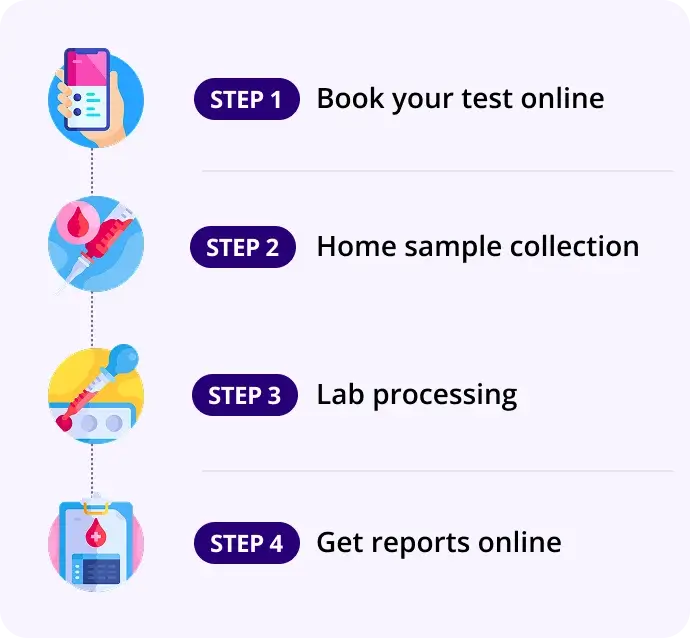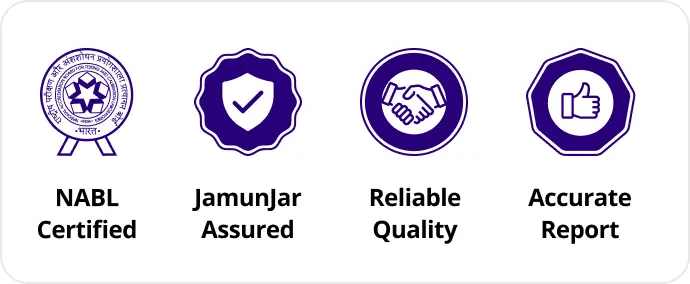Search for
Immunoglobulin A (IgA)
Blood
Report in 4Hrs
At Home
No Fasting Required
Details
Group of blood proteins involved in immune function
₹449₹950
53% OFF
FREE:
Ai Insights
Immunoglobulin A (IgA) - Comprehensive Medical Test Information Guide
- Section 1: Why is it done?
- Test Overview: The IgA test measures the level of Immunoglobulin A, a type of antibody produced by the immune system. IgA is the most abundant antibody in the body and plays a crucial role in mucosal immunity, protecting surfaces such as the respiratory tract, gastrointestinal tract, and urinary system from infections and pathogens.
- Primary Indications for Testing: Suspected immunodeficiency disorders (particularly IgA deficiency); Recurrent infections affecting mucous membranes; Evaluation of celiac disease; Investigation of kidney disease (IgA nephropathy); Assessment of multiple myeloma; Evaluation of chronic infections; Investigation of autoimmune conditions; Screening for immunological abnormalities in patients with recurrent sinusitis, pneumonia, or otitis media
- Typical Timing and Circumstances: Performed when patients present with recurrent infections, particularly respiratory or gastrointestinal; During workup of immunological disorders; As part of comprehensive immunoglobulin panel evaluation; When investigating kidney disease related to immune complex deposition; In patients with family history of immunodeficiency; Prior to blood transfusion (to identify patients with anti-IgA antibodies); During evaluation of patients with gastrointestinal symptoms suggestive of celiac disease
- Section 2: Normal Range
- Reference Range Values: Adults: 70-400 mg/dL (or 0.7-4.0 g/L); Children (varies by age): Ages 0-3 months: 0-20 mg/dL Ages 3-6 months: 10-50 mg/dL Ages 6-12 months: 20-60 mg/dL Ages 1-3 years: 20-80 mg/dL Ages 3-6 years: 30-100 mg/dL Ages 6-12 years: 50-200 mg/dL Ages 12-18 years: 60-300 mg/dL (Note: Reference ranges may vary by laboratory; always refer to your specific laboratory's reference values)
- Units of Measurement: mg/dL (milligrams per deciliter) or g/L (grams per liter)
- Interpretation of Results: Normal: IgA levels within the established reference range indicate adequate immune function and normal antibody production; Low: Values below 70 mg/dL may indicate IgA deficiency, which can range from partial to complete absence of IgA; High: Values above 400 mg/dL may suggest acute or chronic infections, autoimmune diseases, multiple myeloma, or chronic liver disease
- What Normal vs Abnormal Means: Normal IgA indicates the immune system is producing appropriate amounts of this critical antibody for mucosal defense. Abnormal results (high or low) suggest either an overactive immune response (high levels) or immune insufficiency (low levels), both of which warrant further investigation and clinical correlation
- Section 3: Interpretation
- Low IgA (< 70 mg/dL): Indicates selective IgA deficiency (most common primary immunodeficiency in developed countries); May result in recurrent infections, particularly of respiratory and gastrointestinal tracts; Can be associated with celiac disease, autoimmune conditions, and increased risk of anaphylaxis during blood transfusions; Requires counseling about blood product precautions and infection prevention
- High IgA (> 400 mg/dL): May indicate acute bacterial or viral infection; Suggests possible chronic infection or inflammatory condition; Could indicate IgA myeloma (abnormal plasma cell proliferation); May be associated with autoimmune diseases (systemic lupus erythematosus, rheumatoid arthritis); Can reflect chronic liver disease or cirrhosis; Suggests inflammatory bowel disease in appropriate clinical context
- Borderline Values: Values just below or above the reference range should be evaluated in clinical context; Repeat testing may be warranted to confirm results; Patient age, recent infections, and medications should all be considered in interpretation
- Factors Affecting Results: Recent infections (may elevate temporarily); Chronic infections or inflammation (sustained elevation); Medications affecting immune function; Patient age and development (IgA levels increase with age in children); Stress and emotional factors; Smoking status; Presence of malignancy; Autoimmune disease activity
- Clinical Significance of Result Patterns: Isolated low IgA with normal IgG and IgM suggests selective IgA deficiency; Combination of low IgA, IgG, and IgM indicates common variable immunodeficiency; Elevated IgA with other immunoglobulin elevation suggests polyclonal activation (infection or inflammation); Markedly elevated IgA with anemia and renal dysfunction suggests IgA myeloma; Progressive IgA decline may indicate treatment effect or disease progression in monitored patients
- Section 4: Associated Organs
- Primary Organ Systems Involved: Immune system (bone marrow produces IgA-secreting B cells and plasma cells); Mucosal-associated lymphoid tissue (MALT) of respiratory, gastrointestinal, and urinary tracts; Kidneys (target organ in IgA nephropathy); Liver (processes and may be affected by immune complexes); Salivary glands, tear ducts, and mammary glands (produce secretory IgA); Gastrointestinal tract (major source and target of IgA); Respiratory tract (major site of IgA defense)
- Medical Conditions Associated with Abnormal IgA: Low IgA: Selective IgA deficiency, Common variable immunodeficiency, Ataxia-telangiectasia, Celiac disease, Recurrent sinusitis, Recurrent otitis media, Recurrent bronchitis, Recurrent pneumonia, Asthma, Allergic conditions High IgA: IgA nephropathy (Berger's disease), IgA myeloma, Systemic lupus erythematosus, Rheumatoid arthritis, Inflammatory bowel disease (Crohn's disease and ulcerative colitis), Chronic liver disease, Cirrhosis, Hepatitis, Chronic infections, Acute bacterial or viral infections
- Diseases This Test Helps Diagnose or Monitor: IgA deficiency (primary immunodeficiency); IgA nephropathy (primary cause of glomerulonephritis worldwide); IgA myeloma (plasma cell malignancy); Celiac disease (associated with IgA tissue transglutaminase antibodies); Common variable immunodeficiency; Selective IgA deficiency with associated autoimmunity; Chronic infections requiring immune assessment; Autoimmune diseases; Multiple myeloma (particularly IgA type)
- Potential Complications and Risks Associated with Abnormal Results: Low IgA: Increased susceptibility to infections (sinusitis, pneumonia, otitis media); Anaphylactic reactions to blood transfusions (patients with anti-IgA antibodies); Higher risk of autoimmune disease development; Celiac disease association; Increased risk of certain cancers High IgA: Progressive kidney disease with IgA nephropathy potentially leading to renal failure; Multiple myeloma complications (infection, renal dysfunction, anemia); Hepatic dysfunction; Vasculitis complications; Glomerulonephritis with hematuria and proteinuria; Chronic inflammation-related organ damage
- Section 5: Follow-up Tests
- Additional Tests Based on Low IgA Results: IgG and IgM levels (to determine if this is selective or common variable immunodeficiency); IgA tissue transglutaminase (tTG) antibodies (screen for celiac disease); IgE levels (assess for allergic conditions); Complete blood count (CBC) with differential; Comprehensive metabolic panel; Anti-IgA antibody testing (important before blood transfusion); B and T cell lymphocyte counts; Chest X-ray (assess for respiratory infections); Recurrent infection surveillance and documentation
- Additional Tests Based on High IgA Results: IgG and IgM levels (assess overall immunoglobulin profile); Urinalysis with microscopy (assess for hematuria and proteinuria in IgA nephropathy); Serum creatinine and blood urea nitrogen (renal function); Urine protein-to-creatinine ratio (quantify proteinuria); Kidney ultrasound or CT scan; Kidney biopsy (definitive diagnosis of IgA nephropathy); Liver function tests (AST, ALT, bilirubin, alkaline phosphatase); Complete blood count with differential; Bone marrow biopsy (if IgA myeloma suspected); Serum and urine protein electrophoresis; ESR and CRP (inflammatory markers); Autoimmune disease screening (ANA, anti-tissue antibodies)
- Monitoring Frequency for Ongoing Conditions: IgA deficiency: Annual IgA level monitoring; More frequent if infections occur IgA nephropathy: IgA levels every 6-12 months; Kidney function (creatinine, BUN) every 3-6 months; Proteinuria assessment monthly to quarterly IgA myeloma: IgA levels every 1-3 months during treatment; More frequent if treatment changes; Kidney function and bone marrow studies as clinically indicated Autoimmune conditions: IgA monitoring every 6-12 months as part of disease activity assessment
- Related Tests Providing Complementary Information: Immunoglobulin panel (IgA, IgG, IgM, IgD, IgE); Flow cytometry (lymphocyte subset analysis); Immunoelectrophoresis; Serum free light chain assay; Complement levels (C3, C4); Circulating immune complex assay; Anti-IgA antibodies; Lymphocyte proliferation assays; Nitroblue tetrazolium test (NBT); Immunoglobulin G subclass levels; Specific antibody response testing (response to vaccinations)
- Section 6: Fasting Required?
- Fasting Requirement: NO - Fasting is NOT required for an IgA test. The test can be performed on a random blood sample at any time of day, regardless of food or fluid intake.
- Blood Collection Requirements: A standard venipuncture blood draw is required; Approximately 5-10 mL of blood is collected; The sample is placed in a serum separator tube (gold-top) or plain red-top tube; Blood sample should be allowed to clot at room temperature for 30 minutes; Sample is then centrifuged to separate serum; Serum is transferred to a sterile container for analysis
- Medications to Avoid: No medications need to be withheld specifically for the IgA test; However, certain medications may artificially affect IgA levels and should be reported to your healthcare provider: • Immunosuppressants (may lower IgA) • Corticosteroids (may lower IgA) • Antibiotics (recent use should be noted) • Biologics targeting B cells or plasma cells • Any medications being taken should be discussed with the ordering physician
- Other Patient Preparation Requirements: No special preparation needed; Patient may eat and drink normally before the test; Adequate hydration is helpful (improves blood flow for collection); Wear loose-fitting clothing with easily accessible sleeves for blood draw; Arrive on time to reduce anxiety; Inform phlebotomist of any history of difficult venipuncture or fainting; Report recent infections or illnesses (may temporarily affect IgA levels); If part of a comprehensive immunoglobulin panel, coordinate timing with other required tests; For consistent results in monitoring studies, try to maintain similar testing times of day on subsequent tests
- Additional Information: Results typically available within 1-3 business days; Some laboratories may provide results within 24 hours; Testing is commonly performed at reference laboratories or hospital-based labs; Sample must be processed and analyzed by qualified laboratory technicians; Results should be interpreted by a healthcare provider in clinical context; If blood products or transfusion is anticipated, ensure IgA testing and anti-IgA antibody testing are completed beforehand; Pregnant women can safely have IgA testing; No radiation exposure or contrast agents involved
How our test process works!

